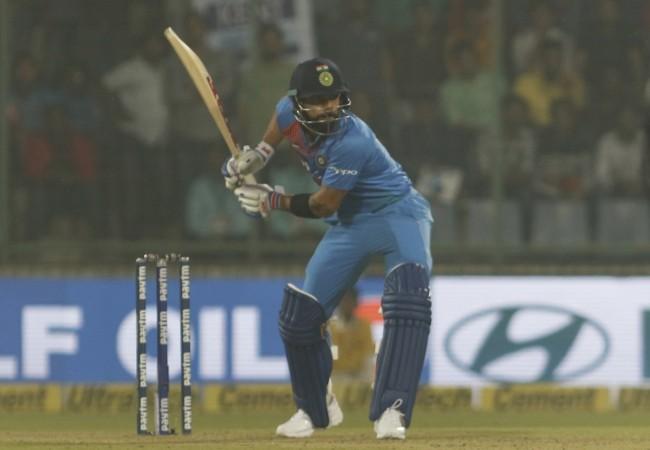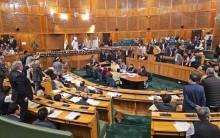
India captain Virat Kohli was seen using a walkie-talkie during the 1st Twenty20 International against New Zealand at Delhi's Feroz Shah Kotla stadium on Wednesday evening (November 1). Was this move against the rules of the International Cricket Council? Read on to find out.
Kohli, who was sitting in the dug-out during India's batting innings, was captured on TV talking to someone on a walkie-talkie. This incident happened in the 15th over with Rohit Sharma and Shikhar Dhawan batting in the middle.
As per rules of the ICC, no mobile devices are allowed in the Players' and Match Officials' Areas (PMOA) during an international match. However, there are exceptions to this.
During any game, match officials and players use walkie-talkies to communicate to the persons in the dressing room from the ground. In T20Is, most of the players are seated in the dug-out, near the boundary.
At yesterday's match, Kohli was padded up to bat and was seen communicating with someone via the walkie-talkie. While many felt he had violated the rules, he was given clean chit by the Board of Control for Cricket in India (BCCI).
India won the opening T20I by 53 runs to take a 1-0 lead in the three-match series. The match in Delhi was Ashish Nehra's final game as he bid adieu to international cricket.
Here are ICC regulations on use of mobile devices
ARTICLE 4 USE OF COMMUNICATION DEVICES IN THE PMOA
4.1 Subject strictly to the exceptions set out in Article
4.2, the following prohibitions shall apply from the moment that the first Player of any participating team enters the PMOA for an International Match right through until the formal conclusion of the day's play:
4.1.1 no person shall be allowed to use and/or carry any Mobile Device for any reason whatsoever, whether to access the Internet or otherwise, in the PMOA;
4.1.2 no person shall be allowed to use and/or or carry, any laptop computer (or any other similar communication device) for any reason whatsoever, whether to access the Internet or otherwise, in the PMOA; and
Kohli is using what looks like a walkie-talkie. Are cricketers allowed to use that during a match? #INDvNZ #T20 #FifteenthOver pic.twitter.com/4vu5wSYPaZ
— Pradeep P Bomble (@pradeeppb26) November 1, 2017
4.1.3 no person shall be allowed to use any static / landline (or similar) telephone capable of making calls from inside or receiving calls from outside the PMOA.
4.2 Unless otherwise agreed by the ICC Anti-Corruption Manager in advance, the only exceptions to the above prohibitions are:
4.2.1 each team manager shall be permitted to carry a Mobile Device within the PMOA, provided that it can only be used either: (a) by him/her for cricket operations purposes; and/or (b) by any Player or Player Support Personnel for any important personal matter, provided that the team manager has given his express permission to the Player or Player Support Personnel before such use;
4.2.2 each team media manager shall be permitted to carry a Mobile Device within the PMOA but any such device must be turned onto silent mode at all times whilst such individual is in the PMOA and must not be used for any purpose inside the PMOA.
4.3 For the avoidance of doubt, none of the foregoing provisions shall operate to prevent:
4.3.1 the use of two-way handheld device that uses dedicated frequencies over short distances (ie a 'walkie-talkie') by Player Support Personnel for the purpose of communication between the dugout and dressing room area for medical and/or tactical reasons only, provided that such communication devices are suitably encrypted to avoid detection by any third party in the nearby vicinity;













